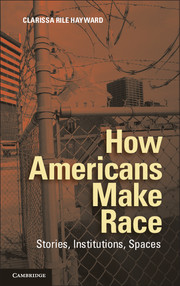Crossref Citations
This Book has been
cited by the following publications. This list is generated based on data provided by Crossref.
Moynihan, Donald P.
and
Soss, Joe
2014.
Policy Feedback and the Politics of Administration.
Public Administration Review,
Vol. 74,
Issue. 3,
p.
320.
Stone, Clarence N.
2015.
Reflections on Regime Politics.
Urban Affairs Review,
Vol. 51,
Issue. 1,
p.
101.
Carson, James
2015.
The Columbian Covenant.
p.
69.
Luminais, Misty
and
Williams, Rhonda Y
2016.
Marching toward justice: Lessons learned from the Shaw High School Mighty Cardinals Marching Band in East Cleveland.
Education, Citizenship and Social Justice,
Vol. 11,
Issue. 3,
p.
231.
Severs, Eline
Celis, Karen
and
Erzeel, Silvia
2016.
Power, privilege and disadvantage: Intersectionality theory and political representation.
Politics,
Vol. 36,
Issue. 4,
p.
346.
Hayward, Clarissa Rile
and
Watson, Ron
2017.
Identity politics and democratic nondomination.
Contemporary Political Theory,
Vol. 16,
Issue. 2,
p.
185.
Severs, Eline
Celis, Karen
and
Erzeel, Silvia
2017.
Poder, privilegio y desventaja: teoría interseccional y representación política.
Investigaciones Feministas,
Vol. 8,
Issue. 1,
p.
41.
Sellers, Jefferey M.
2017.
Inequality and Governance in the Metropolis.
p.
1.
Soss, Joe
and
Weaver, Vesla
2017.
Police Are Our Government: Politics, Political Science, and the Policing of Race–Class Subjugated Communities.
Annual Review of Political Science,
Vol. 20,
Issue. 1,
p.
565.
Temin, David Myer
and
Dahl, Adam
2017.
Narrating Historical Injustice: Political Responsibility and the Politics of Memory.
Political Research Quarterly,
Vol. 70,
Issue. 4,
p.
905.
Swanstrom, Todd
2017.
Rejoinder to Critics of Place Matters.
Urban Affairs Review,
Vol. 53,
Issue. 1,
p.
219.
Hayward, Clarissa Rile
2018.
On structural power.
Journal of Political Power,
Vol. 11,
Issue. 1,
p.
56.
Roulier, Scott M.
2018.
Shaping American Democracy.
p.
181.
King, Loren
and
Blake, Michael
2018.
Global cities, global justice?.
Journal of Global Ethics,
Vol. 14,
Issue. 3,
p.
332.
Trounstine, Jessica
2018.
Segregation by Design.
BAGG, SAMUEL
2018.
The Power of the Multitude: Answering Epistemic Challenges to Democracy.
American Political Science Review,
Vol. 112,
Issue. 4,
p.
891.
Nuti, Alasia
2019.
Injustice and the Reproduction of History.
Haslanger, Sally
2019.
Cognition as a Social Skill.
Australasian Philosophical Review,
Vol. 3,
Issue. 1,
p.
5.
Bedi, Sonu
2019.
Private Racism.
Clay, Kevin L.
2019.
“Despite the Odds”: Unpacking the Politics of Black Resilience Neoliberalism.
American Educational Research Journal,
Vol. 56,
Issue. 1,
p.
75.



